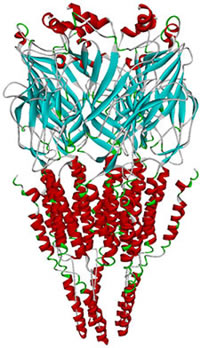Neurobiology Laboratory

Research Summary
Jerrel L. Yakel, Ph.D., is the head of the Ion Channel Physiology Group. His group studies the cholinergic receptor regulation of the septal-hippocampal-cortical circuit, and determines how the cholinergic system is modulated by environmental factors (e.g. nicotine, therapeutics, pesticides, exercise) and contributes to the pathophysiology of neurological diseases. The overarching goal is to mitigate circuit dysfunction and cognitive decline since dysfunction of the cholinergic system in the basal forebrain is a hallmark of Alzheimer’s Disease (AD).
There are two main types of cholinergic receptors, the nicotinic acetylcholine receptor channels (nAChRs; see image below), which are ligand-gated ion channels, and the G protein-coupled muscarinic receptors (mAChRs). Both types of receptors are expressed throughout the central and peripheral nervous system and are involved in a variety of normal brain functions including cognitive tasks, neuronal development, and mediating the rewarding effects of nicotine (for the nAChRs). Drugs acting on these receptors can enhance cognition and therefore may be useful in the treatment of AD and dementia, and are neuroprotective. However, drugs acting on these receptors can also be linked with movement and neurodevelopemental disorders, cognitive and behavioral disabilities, and infant deaths due to exposure in utero. Therefore, it is critical to understand the relative roles that environmental and endogenous neurochemicals and therapeutics have on the cholinergic system, and how this may be involved in the susceptibility and progression of neurodegenerative diseases and disorders. To achieve these goals and to aid in the development of therapeutic agents that may help in the treatment of these diseases, it will be essential to understand the basic mechanisms of neuronal signaling and regulation in the cholinergic system.
Major areas of research:
- Cholinergic receptor regulation of memory encoding and consolidation
- Role of cholinergic receptors in excitability of neuronal circuits in the septal-hippocampal-cortical circuits
- Structure/function aspects of peptide interaction and inhibition of nicotinic receptor

Molecular model of the α7 nicotinic receptor. A larger view of this image is available.
Current projects:
- Role of the temporoammonic pathway during slow-wave sleep and memory consolidation
- Integration of hippocamposeptal projections into basal forebrain circuitry
- Role of acetylcholine within the nucleus accumbens during wheel running
- Cholinergic signalling in the ventral subiculum and how this mediates avoidance response to threats
- Role of the α7 subtype of nAChRs in viral infection relating to SARS-CoV-2 and HSV-1; regulation of the inflammatory pathways
- Co-transmission of acetylcholine and other neurotransmitters
- How do cholinergic neurons change during brain development
Yakel received his B.S. from Oregon State University, and his Ph.D. from the University of California, Los Angeles, where he studied ligand-gated ion channels and serotonin receptors in cultured hippocampal neurons and cell lines with Meyer Jackson. During a postdoctoral fellowship with the late Hersch Gerschenfeld at the Ecole Normale Superieure (Paris, France), he investigated the regulation of voltage-gated calcium channels by G protein-coupled receptors. During a second postdoctoral stage at the Vollum Institute with Alan North and Tom Soderling, he studied the function of regulation of ligand-gated ion channels. Yakel joined NIEHS as an investigator in 1993 and is currently a Senior Investigator in the Laboratory of Neurobiology.


